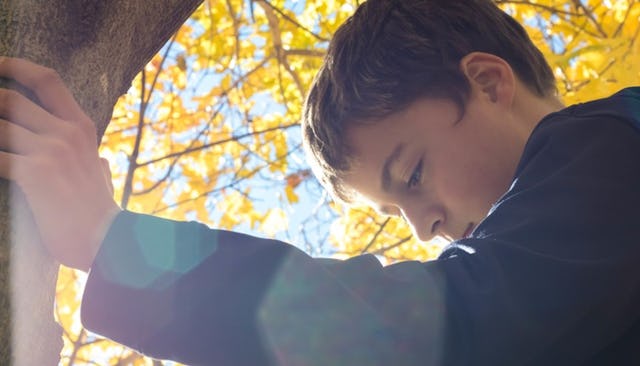Parenting Through Puberty Is Not For The Faint Of Heart: A Guide For Moms Of Boys

Every day after school, my 14-year-old son comes in off the bus like a shot. He slams the front door, drops his backpack, and is up the stairs before the house has stopped reverberating.
“Hi!” I call after him.
“Hi, Mom!” he calls back and slams his bedroom door.
Man, I think, is he that pent up? Puberty has come to our house like a bear waking to spring. I recognized the warning signs years ago. It’s not difficult. His hair greased up, his armpits stank, and his face broke out. So I quit walking into his room without knocking. I don’t want to know what I don’t need to know.
The physical changes that puberty brings are more awe-inspiring than terrifying. I tell my son that he regularly goes up to bed looking like one kid and comes down in the morning looking like an entirely different one. One day, he came down with thighs where he once had twigs. Next, he grew biceps. Recently he came down with his father’s feet and discovered that he’d outgrown his shoes overnight. Yes, overnight. It’s like a human magic show, and all my husband and I have to do is feed the child enough to keep it going.
The emotional changes, however, that’s where my mom worry has kicked up a notch. I may be female, but I remember well the unfamiliar social and emotional terrain that puberty requires one to slog. Last weekend, our son came to us with a story about drama at his lunch table, and I was immediately transported back to the days when something as small as the logo on one’s shirt could lead to cruel whispers, passed notes, and even exile.
More disturbing, I found myself insanely happy to hear that he’d had such a rotten day. I had to tell myself, “Quit smiling!” I wasn’t glad that he was hurting, of course. I was just so blessedly relieved that he’d chosen to talk to us about it. I may not know what’s going on in his room after school, but I know that his every emotional instinct right now tells him to pull away from his father and me. I can see it happening in real-time. He no longer fills the car with chatter. He texts as much as he speaks. Our conversations are increasingly transactional: “We need to leave in 15 minutes.” “I’ll pick you up at 6:30.” “Please set the table before you disappear.”
Without the benefit of our interpersonal or even nonverbal communication patterns to rely on, I’m left to watch for passive signs of his well-being. Are his grades all right? Yes. Does he have friends, and do I like them? Yes and yes. Is he kind when I’m not watching? Thankfully, yes.
Puberty, I know, is just a phase. It doesn’t last forever. But like every other developmental stage, it provides crucial clues to a child’s inner life. I worry that I’m missing or misreading them. For now, I tell myself that as long as my son doesn’t completely shut himself down or his father and I out, he’ll be okay. At least I’m going to believe that until I have data to indicate otherwise.
I just hope our hinges can withstand the next several years. His two brothers aren’t far behind on the evolutionary timeline.
This article was originally published on